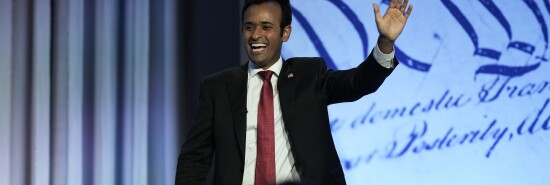
Vivek Ramaswamy’s foreign policy instincts are OK, his initiatives need a rethink
Tom Rogan
GOP presidential candidate Vivek Ramaswamy sparked controversy on Monday. He told radio host Hugh Hewitt that if elected president, he would resist a Chinese invasion of Taiwan, but only up until “2028.”
Ramaswamy asserted that “Xi Jinping should not mess with Taiwan until we have achieved semiconductor independence, until the end of my first term when I will lead us there. And after that, our commitments to Taiwan, our commitments to be willing to go to military conflict, will change after that, because that’s rationally in our self-interest.”
CONGRESS SHOULD SUMMON HSBC EXECUTIVES OVER SUPPORT FOR HONG KONG REPRESSION
Many Americans would agree that Ramaswamy’s focus on the national “self-interest” is the correct one. Taiwan deserves scrutiny here in that it continues to pay woefully inadequate attention to its own defense. Ramaswamy’s prioritization of semiconductor manufacturing is also praiseworthy — especially considering the pro-China duplicity of U.S. manufacturers such as Intel’s Pat Gelsinger.
Still, the entrepreneur’s blase offer of a deferred invitation to Xi Jinping to attack Taiwan is problematic for four reasons. First off, it fits with Xi’s timeline directive that the People’s Liberation Army be ready to invade Taiwan only by 2030.
Second, it fails to recognize that U.S. interests in Taiwan extend beyond its world-leading TSMC semiconductor manufacturing base. They include far broader economic concerns, the defense of U.S. allies in Japan and the Philippines, and China’s effort to cajole the international community into a new feudal economic-political order with Beijing at the top.
Third, Ramaswamy offers too casual a relinquishing of the post-1945 U.S.-led commitment to a democratic international order.
Fourth, the candidate deludes himself by claiming he could deter China from invading Taiwan by moving U.S. submarines to the Pacific and regularly sending Navy destroyers on transits of the Taiwan Strait. Even in 2023, the PLA is far better predisposed than commonly understood to launch a successful invasion of Taiwan. Even, that is, in the scenario of the U.S. military intervening against the PLA.
To his credit, Ramaswamy admits that he’s a newcomer to foreign policy issues. As he told Hewitt, “Let’s just call a spade a spade: I didn’t know much of this six months ago, but the only difference between me and the other candidates is I’m the only one actually willing to admit that.” Ramaswamy is obviously a smart man, so he has the ability to learn on the campaign job. That said, America’s global power and the central role of the presidency in both affecting and effecting that power means that candidates for the Oval Office need to understand the big issues as soon as possible.
In that regard, Ramaswamy also misunderstands Russia’s growing cooperation with China. He claims that he’d end the war in Ukraine by doing “a deal that yes, does give Putin concessions, but in return for requiring Vladimir Putin to exit his military partnership with China. With respect to Ukraine in particular, I think that we are actually driving Russia further into China’s arms.”
There are two issues with this analysis.
First, it would be morally unjustifiable and politically implausible to end the war on these terms. Kyiv would not accept a Russia-favorable end to the war simply because the U.S. demanded it or leveraged its support for Ukraine. A little-noted point here is that while Western support for Ukraine is crucial in enabling its conduct of offensive action, Ukraine could effectively defend against Russian forces with greatly reduced Western support.
CLICK HERE TO READ MORE FROM THE WASHINGTON EXAMINER
Moreover, Putin is not just going to give up on his military partnership with China. Even if Putin agreed to do so, he would be lying. Ramaswamy is right that it is deeply concerning to see Putin’s close relationship with Xi. But he is wrong as to why Putin is doing so. It’s not because the U.S. is “driving” Russia into China’s arms, but rather because Russia’s retained great power influence and economic interests demand that reorientation. Russia needs Chinese diplomatic and economic support, and both Beijing and Moscow find mutual benefit in their cooperative alignment against the U.S.
The way to separate Russia from China is to flip that equation on its head. Namely, by pressuring the European Union to recognize that it should put far greater pressure on Beijing to stop supporting Moscow as Russia wages war on the European continent. If the EU truly leveraged its economic relationship with Beijing in that pursuit, Beijing would quickly cool its cooperation with Moscow. But until the EU does so, Beijing will believe it can have both its EU economic cake and keep feeding Russia.
Top line: it has potential, but Ramaswamy’s foreign policy agenda needs some work.
